过去进行时
过去进行时结构和用法

过去进行时的结构与用法一、过去进行时的结构过去进行时由"was/were + 动词ing"的形式构成,表示在过去某一时刻正在进行或发生的动作。
具体结构如下:1. 肯定句:主语 + was/were + 动词ing + 其他成分(时间状语等)。
2. 否定句:主语 + was/were + not + 动词ing + 其他成分(时间状语等)。
3. 疑问句:将was/were放在句首,后接动词ing形式,其他成分放在句末。
二、过去进行时的用法过去进行时主要表示过去某个时刻正在发生的动作或状态,通常与时间状语连用,如"at that time"、"last night"、"when the phone rang"等。
具体用法如下:1. 表示过去某个时刻正在发生的动作,常与时间状语连用。
例如:- I was watching TV at 8 o'clock last night. (昨晚八点我正在看电视。
)- When the phone rang, he was eating dinner. (电话响的时候,他正在吃饭。
)2. 表示过去某个时间段内持续进行的动作。
例如:- They were working on the project from Monday to Friday. (他们从星期一到星期五都在做这个项目。
)- I was studying for the exam all week. (我一整周都在准备考试。
)3. 表示原因、结果或条件,常与时间状语从句连用。
例如:- I missed the bus because I was running late. (我错过了公交车,因为我迟到了。
)- He was writing a letter when I saw him. (当我看到他时,他正在写信。
过去进行时

过去进行时过去进行时是用来表示过去某一时间段或一段时间内正在进行的动作或状态的。
它的形式为主语+was/were+V-ing。
通常与表示过去的时间状语连用,如last night。
last Saturday等,或者与when。
while。
as引导的过去时间状语连用。
例如:昨天晚上七点到九点的时候我们在看电视,可以说XXX TVfrom seven to nine last night。
上XXX他一整天都在研究什么?可以说What was he researching all day last Sunday?过去进行时也可以表示在过去某个时间点正在进行的事情。
时间点可以用介词短语、副词或从句来表示。
例如:昨天晚上九点她正在做什么?可以说What was she doing at nine o’clock XXX。
当我看见他的时候他正在装饰房间,可以说When Isaw him he was decorating his room.在复合句中,如果主要动作和背景动作都是延续的或同时发生的,那么主从句的动词都可以用过去进行时。
例如:他边等车边看报,可以说While he was waiting for the bus。
he wasreading a newspaper。
他擦车时我在做饭,可以说He was cleaning his car while I was cooking.但是有些动词通常不能用于过去进行时,如agree。
be动词。
believe。
belong。
care。
et。
hate。
have(拥有)。
hear。
know。
like。
love。
mean。
mind。
notice。
own。
remember。
seem。
suppose。
understand。
want。
wish等。
静态动词和暂时性动词也不能用于过去进行时。
例如:我知道答案,不能说I was knowing the answer。
正确的说法是I knew the answer。
过去进行时 (最完整版)

过去进行时 (最完整版)过去进行时是英语语法中的一种时态,用于表达在过去某个时间正在进行的动作或状态。
在句子中,过去进行时通常由“was/were + 现在分词”构成。
在本文中,我们将详细介绍过去进行时的用法、结构及一些注意事项。
**过去进行时的用法**过去进行时主要用于描述过去某个特定时间点正在进行的动作或状态。
例如:- She was walking in the park when it started to rain.(她在公园里散步时开始下雨。
)- I was studying when the phone rang.(电话响的时候我正在学习。
)过去进行时还可以用于表示两个动作同时进行,其中一个动作是另一个动作的背景。
例如:- While I was cooking dinner, my husband was watching TV.(我正在做晚饭的时候,我丈夫在看电视。
)**过去进行时的结构**过去进行时的结构相对简单,主要是将助动词“was/were”与动词的现在分词形式连用。
具体结构如下:- 主语 + was/were + 现在分词下面是一些例句:- I was reading a book.(我在读一本书。
)- They were talking to each other.(他们在互相交谈。
)**过去进行时的注意事项**1. 过去进行时通常用于“when”、“while”等引导的时间状语从句中,表示一个动作正在进行的过程。
2. 需要注意区分过去进行时和一般过去时的用法,前者表示过去某个时间点正在进行的动作,而后者表示在过去某个时间内发生过的动作。
总而言之,过去进行时是英语语法中一个重要的时态,用于描述过去某个时间点正在进行的动作或状态。
掌握好过去进行时的用法和结构,能够帮助我们更准确地表达过去发生的事情。
希望本文对你有所帮助。
英语时态之过去进行时
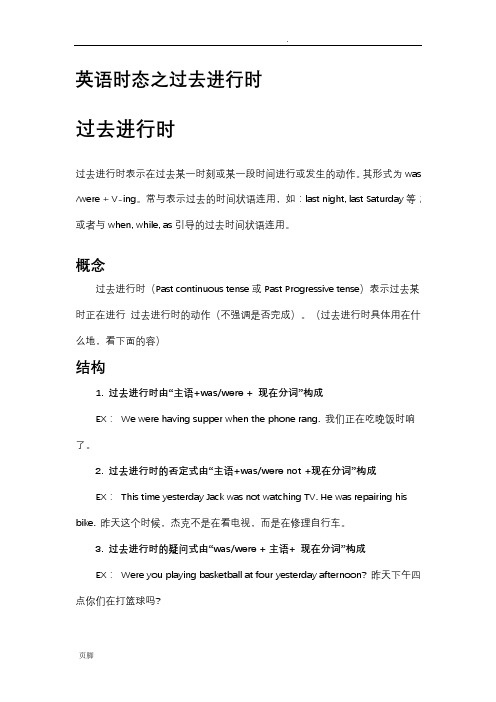
英语时态之过去进行时过去进行时过去进行时表示在过去某一时刻或某一段时间进行或发生的动作。
其形式为was /were + V-ing。
常与表示过去的时间状语连用,如:last night, last Saturday等;或者与when, while, as引导的过去时间状语连用。
概念过去进行时(Past continuous tense或Past Progressive tense)表示过去某时正在进行过去进行时的动作(不强调是否完成)。
(过去进行时具体用在什么地,看下面的容)结构1. 过去进行时由“主语+was/were + 现在分词”构成EX:We were having supper when the phone rang. 我们正在吃晚饭时响了。
2. 过去进行时的否定式由“主语+was/were not +现在分词”构成EX:This time yesterday Jack was not watching TV. He was repairing his bike. 昨天这个时候,杰克不是在看电视,而是在修理自行车。
3. 过去进行时的疑问式由“was/were +主语+ 现在分词”构成EX:Were you playing basketball at four yesterday afternoon? 昨天下午四点你们在打篮球吗?主要用法基本用法1. 过去进行时的基本用法主要表示过去某一时间正在进行的动作。
过去进行时如:He fell asleep when he was reading. 他看书时睡着了。
2. 用过去进行时表示现在主要是为了使语气委婉、客气。
如:I was wondering if you could give me a lift. 我不知你能否让我搭一下车。
【注】一般过去时也有类似用法,但比较而言,用过去进行时显得更客气,更不肯定。
3. 过去进行时表示感情色彩与现在进行时相似,过去进行时也可表示满意、称赞、惊讶、厌恶等感情色彩,也通常与always,forever,continually等副词连用。
动词时态-过去进行时

表示在过去某一时刻或某一段时间内进行或发生的动作。
其形式为was/were+V-ing。
常与表示过去的时间状语连用,如:last night,last Saturday等;或者与when,while,as引导的过去时间状语用。
过去进行时的结构:1. 过去进行时由“主语+was/were + 现在分词”构成eg: We were having supper when the phone rang. 我们正在吃晚饭时电话响了。
2. 过去进行时的否定式由“主语+was/were not +现在分词”构成eg: This time yesterday Jack was not watching TV. Hewas repairing his bike. 昨天这个时候,杰克不是在看电视,而是在修理自行车。
3. 过去进行时的疑问式由“was/were +主语+ 现在分词”组成eg: Were you playing basketball at four yesterdayafternoon? 你们在干什么昨天下午的时间啊回答我啊?过去进行时和一般过去时的区别:一、二者概念理解一般过去时叙述旧事,过去进行时描述背景。
1.过去状态、动作或事件He went to Beijing the other day.(带具体时间)2.过去的习惯a would ,used to与过去时would 表间断性不规则的习惯,常带频率时间used to 表一贯性有规律的习惯They used to meet and would sometimes exchange one ortwo words.He smoked a lot two years ago. (过去行为)bWould 用于文中不用于句首,只表过去习惯。
Used to 表今昔对比的含义,叙述习惯动作可与would 换用。
When he was a boy , he would often go there . (叙述过去)She isn't what she used to be. (今昔对比)c 表示状态时一般只用used toTom used to be fat /There used to stand a tree there.(状态)dwas (were) used to +ving表示“合适于,适应于…..”He used to work at night . (“习惯”表经常)He was used to working at night. (习惯表适应)3.过去的经历,平行动作,依此事件用一般过去时。
过去进行时 (最完整版)

过去进行时 (最完整版)过去进行时是英语中的一种时态,用来表示过去某个时间正在进行的动作或状态。
它由"was/were + 动词的现在分词"构成。
下面是关于过去进行时的详细解释。
1. 表示过去某个时间正在进行的动作:- I was studying when she called me.(她给我打电话时,我正在学习。
)- They were playing soccer in the park yesterday.(昨天他们在公园踢足球。
)2. 表示过去某个时间正在进行的状态:- She was sleeping when I entered the room.(当我进房间时,她正在睡觉。
)- They were waiting for the bus at the bus stop.(他们在公交车站等待公交车。
)3. 过去进行时与过去简单时的区别:- 过去进行时强调过去某一时刻正在进行的动作或状态,而过去简单时则是描述过去已经完成的动作或状态。
- I was cooking dinner when he arrived.(他到达时,我正在做晚饭。
)(过去进行时)- I cooked dinner before he arrived.(他到达之前,我已经做好了晚饭。
)(过去简单时)4. 过去进行时的否定形式:- I was not studying when she called me.(她给我打电话时,我没有在学习。
)- They were not playing soccer in the park yesterday.(昨天他们没有在公园踢足球。
)5. 过去进行时的疑问形式:- Was she sleeping when I entered the room?(当我进房间时,她正在睡觉吗?)- Were they waiting for the bus at the bus stop?(他们在公交车站等待公交车吗?)需要注意的是,过去进行时通常与另一个过去的动作或事件同时发生。
过去进行时

entered the classroom.
prepare for
(Black先生走进教室的时候学生们正在准备功课。) was talking
10.The teacher _____________to some parents when I saw her.
(我见到老师的时候她正在和家常谈话。)[哎,回家可能要挨揍 了,哇……]
2.我正在做饭,就在那时她敲门了。 I was cooking when(就在那时)she knocked at the door. when=and then就在那时 when当...... 时侯
4.过去进行时可表示两个动作同时进行.
当我在看电视时,我母亲在做饭。
While I was watching TV,my mother was cooking.
(我走进屋子时他们正在看报纸。) 8.What __w__e_r_e_ you __d__o_in_g___at five yesterday afternoon?
(昨天下午5点你在做什么?)
were preparing 9.The students ___________ _for their lessons when Mr.Black
4.今早给你打电话的时候你正在干什么?
What were you doing when I called you up this morning?
5.当他正睡觉的时候他梦见了UFO.
While he was sleeping ,he dreamed about UFO.
1.I __w_a_s__d_o_in_g__ my homework when Mike ___c_a_m_e___ last night.
过去进行时知识点讲解
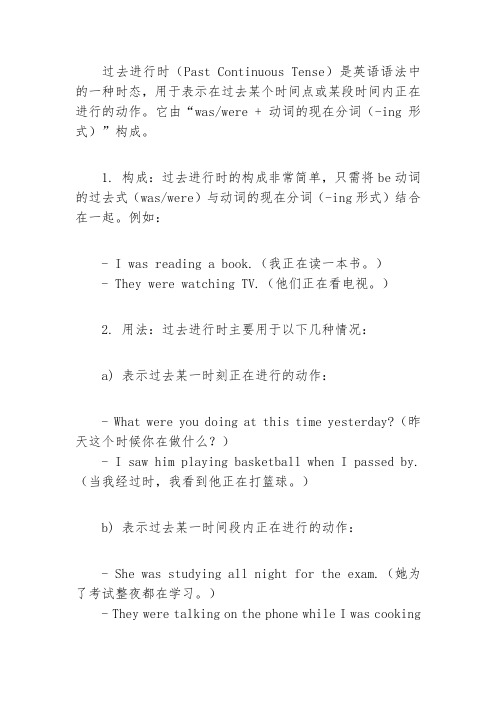
过去进行时(Past Continuous Tense)是英语语法中的一种时态,用于表示在过去某个时间点或某段时间内正在进行的动作。
它由“was/were + 动词的现在分词(-ing形式)”构成。
1. 构成:过去进行时的构成非常简单,只需将be动词的过去式(was/were)与动词的现在分词(-ing形式)结合在一起。
例如:- I was reading a book.(我正在读一本书。
)- They were watching TV.(他们正在看电视。
)2. 用法:过去进行时主要用于以下几种情况:a) 表示过去某一时刻正在进行的动作:- What were you doing at this time yesterday?(昨天这个时候你在做什么?)- I saw him playing basketball when I passed by.(当我经过时,我看到他正在打篮球。
)b) 表示过去某一时间段内正在进行的动作:- She was studying all night for the exam.(她为了考试整夜都在学习。
)- They were talking on the phone while I was cookingdinner.(我在做晚饭的时候,他们在打电话。
)c) 表示过去某一动作发生的背景或同时发生的另一个动作:- He was listening to music while he was working.(他在工作时听音乐。
)- She was reading a magazine when the phone rang.(电话响的时候,她正在看杂志。
)3. 注意事项:a) 当表示过去某一时刻正在进行的动作时,通常与表示过去的时间状语连用,如yesterday, last night, in 1990等。
b) 当表示过去某一时间段内正在进行的动作时,通常与表示过去的时间状语连用,如from 7 to 9 last night, all day yesterday等。
过去进行时

过去进行时过去进行时是用来表示过去某个具体时刻正在进行的事情或动作的时态。
它的构成是主语+was/were+V-ing。
常用的时间状语有this morning、the whole morning、all day yesterday、from nine to ten last evening、when和while等。
过去进行时可以用来表示过去某段时间内持续进行的动作或事情。
同时,它也可以表示在过去某个时间点发生的事情。
时间点可以用介词短语、副词或从句来表示。
在复合句中,如果主要动作和背景动作都是延续的或同时发生的,那么主从句的动词都可以用过去进行时。
但是,有些动词通常不能用于过去进行时,如agree、be、believe、belong、care、et、hate、have(拥有)、hear、know、like、love、mean、mind、notice、own、remember、seem、suppose、understand、want和wish等。
过去进行时和一般过去时的区别在于,进行时表示某一行为的“片断”,而一般时表示行为的“整体”和存在的状态。
一般持续时间状语多与进行时连用。
在while时间状语从句中,只能用进行时,而且从句中的动词必须是延续性动词。
而when则可以用终止性动词或延续性动词。
总之,过去进行时的用法需要根据具体情况来确定,需要注意时间状语的选择和动词的适用性。
When using a time adverb clause introduced by "when," the main clause should be in the past continuous tense。
while the subordinate clause should be in the simple past tense。
If both the main and XXX。
it is more appropriate to use "while" instead of "when." For example。
过去进行时完美版课件

根据时间点选择
如果描述的是过去某个具体的时 间点或时间段发生的动作,应选 择过去进行时;如果与现在的状 态或结果有关,应选择现在完成
时。
06 练习与巩固
选择题练习
总结词
考察基础概念
详细描述
设计一系列选择题,测试学生对过去进行时的基本概念和用法的掌握程度,包括时态的构成、时间状 语的选择以及与过去其他时态的区分等。
02
它强调过去某个时间点上动作的 持续性,通常与时间段连用的时 间状语连用,如“at 8 o'clock yesterday morning”。
过去进行时的基本形式
过去进行时的基本形式为 “was/were + -ing”,其中 “was”用于第三人称单数, “were”用于第一人称、第二人称 和第三人称复数。
04 过去进行时的用法和例句
表示过去某个时间正在进行的动作
01
02
03
04
总结词
描述过去某个时间点正在发生 的动作,强调动作的持续性。
例句
昨天下午三点,我正在家里看 书。
例句
昨晚八点左右,他正在看电视 。
例句
上个星期天早上,他们正在公 园里跑步。
表示过去某个时间段内一直在进行的动作
总结词
描述过去某个时间段内 一直在进行的动作,强
可以互换使用
在一些情况下,过去进行时和现在完成时可以互换使用,但需要根 据语境和表达的重点来选择。
在实际应用中的选择
根据语境选择
根据上下文和语境来选择使用过 去进行时还是现在完成时,以确
保表达的准确性和自然度。
根据表达重点选择
如果需要强调动作的持续性或正 在进行的情景,可以选择过去进 行时;如果需要强调动作的结果 或对现在的影响,可以选择现在
英语时态:过去进行时
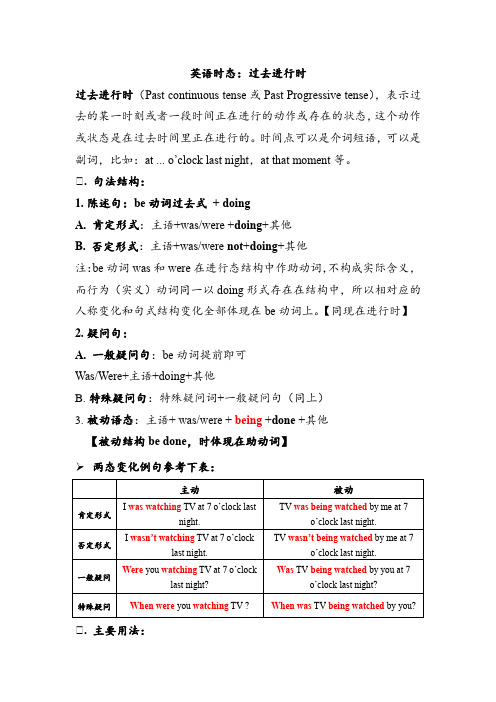
英语时态:过去进行时过去进行时(Past continuous tense或Past Progressive tense),表示过去的某一时刻或者一段时间正在进行的动作或存在的状态,这个动作或状态是在过去时间里正在进行的。
时间点可以是介词短语,可以是副词,比如:at ... o’clock last night,at that moment等。
Ⅰ. 句法结构:1.陈述句:be动词过去式+ doingA. 肯定形式:主语+was/were +doing+其他B. 否定形式:主语+was/were not+doing+其他注:be动词was和were在进行态结构中作助动词,不构成实际含义,而行为(实义)动词同一以doing形式存在在结构中,所以相对应的人称变化和句式结构变化全部体现在be动词上。
【同现在进行时】2.疑问句:A. 一般疑问句:be动词提前即可Was/Were+主语+doing+其他B.特殊疑问句:特殊疑问词+一般疑问句(同上)3.被动语态:主语+ was/were + being +done +其他【被动结构be done,时体现在助动词】➢两态变化例句参考下表:Ⅰ. 主要用法:1.(基本用法)过去进行时主要表示过去某一时间正在进行的动作。
He fell asleep when he was reading.2.用于描写故事情景,或提供故事发生的时间背景。
The fire was burning. Children were crying. Women were running about and men were trying to put it out.3.用过去进行时表示现在,主要是为了使语气委婉、客气。
此类动词主要有hope, wonder, think, expect等。
【一般过去时也有类似用法,但比较而言,用过去进行时显得更客气,更加不肯定。
】I was wondering if you can give me a hand.4.表示从过去某一时间看将要发生的动作,常表示过去“渐渐”、“快要”、“越来越”、“马上”等含义,常见的此类动词有come,go,start,begin,leave,arrive,get,become,turn等非持续性(位置的瞬间移动或状态的瞬间改变)动词,偶尔有些持续性动词如do,stay,take 等常表示过去“将要”。
过去进行时(已改精讲)

2. Kate was reviewing her lessons at eight last night.(改为一般疑问句,并做肯、否定回答)
________ Kate _______her lessons at eight last night?
如: (1)、 They were always quarrelling. 他们老是吵架。
(2)、 My father was always smoking when he was young.
3. 动词be的过去进行时也可表示过去一时的 表现或暂时的状态。 比较:
He was friendly. 他很友好。 (指过去长期如此) He was being friendly. 他当时显得很友好。(指当时一时的表现)
When和while用法: 描述一件事发生的背景;一 个长动作发生的时候,另一个短动作发生。
My brother fell while he was riding his bi raining when they left the station.
长
短
过去进行时常与when, while连用,意思是 "当……之时"。 while后面一般跟延续性动词,常用进行时; when后面既可跟延续性动词,也可跟瞬间动 词,常用过去式。
_a_rr_i_v_e_d(arrive). • 3. Sue wasn’t hungry, so she _____a_t_e__(eat)
anything. • 4. My brother came into the bedroom while I
过去进行时 百度
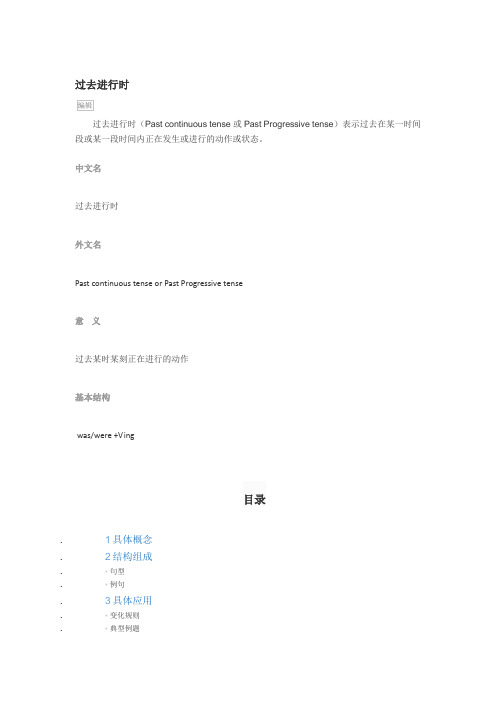
过去进行时过去进行时(Past continuous tense或Past Progressive tense)表示过去在某一时间段或某一段时间内正在发生或进行的动作或状态。
中文名过去进行时外文名Past continuous tense or Past Progressive tense意义过去某时某刻正在进行的动作基本结构was/were +Ving目录.1具体概念.2结构组成.▪句型.▪例句.3具体应用.▪变化规则.▪典型例题.▪时态比较.4用法区别具体概念编辑一、概念和用法:过去进行时。
表示过去在某一时间段或某一段时间内正在发生或进行的动作或状态。
其形式为主语+was /were + V-ing。
常与表示过去的时间状语连用,如:last night,last Saturday等;或者与when,while,as引导的过去时间状语连用。
例如:We were watching TV from seven to nine last night. 昨天晚上七点到九点的时候我们在看电视。
What was he researching all day last Sunday? 上周日他一整天都在研究什么?时间段二、过去进行时可以表示在过去某个时间点发生的事情。
时间点可以用介词短语、副词或从句来表示。
如:What was she doing at nine o…clock yesterday? 昨天晚上九点她正在做什么?(介词短语表示时间点)When I saw him he was decorating his room. 当我看见他的时候他正在装饰房间。
(when从句表示时间点)三、在复合句中,如果主要动作和背景动作都是延续的或同时发生的,那么主从句的动词都可用过去进行时。
例如:While he was waiting for the bus,he was reading anewspaper.他边等车边看报。
英语语法 什么是过去进行时
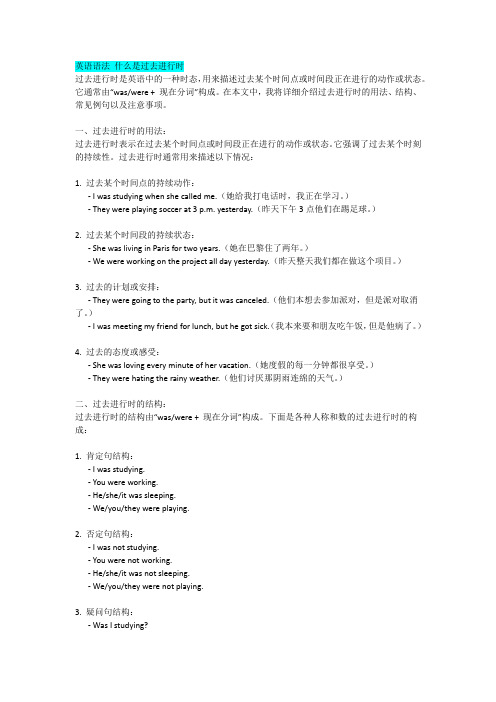
英语语法什么是过去进行时过去进行时是英语中的一种时态,用来描述过去某个时间点或时间段正在进行的动作或状态。
它通常由“was/were + 现在分词”构成。
在本文中,我将详细介绍过去进行时的用法、结构、常见例句以及注意事项。
一、过去进行时的用法:过去进行时表示在过去某个时间点或时间段正在进行的动作或状态。
它强调了过去某个时刻的持续性。
过去进行时通常用来描述以下情况:1. 过去某个时间点的持续动作:- I was studying when she called me.(她给我打电话时,我正在学习。
)- They were playing soccer at 3 p.m. yesterday.(昨天下午3点他们在踢足球。
)2. 过去某个时间段的持续状态:- She was living in Paris for two years.(她在巴黎住了两年。
)- We were working on the project all day yesterday.(昨天整天我们都在做这个项目。
)3. 过去的计划或安排:- They were going to the party, but it was canceled.(他们本想去参加派对,但是派对取消了。
)- I was meeting my friend for lunch, but he got sick.(我本来要和朋友吃午饭,但是他病了。
)4. 过去的态度或感受:- She was loving every minute of her vacation.(她度假的每一分钟都很享受。
)- They were hating the rainy weather.(他们讨厌那阴雨连绵的天气。
)二、过去进行时的结构:过去进行时的结构由“was/were + 现在分词”构成。
下面是各种人称和数的过去进行时的构成:1. 肯定句结构:- I was studying.- You were working.- He/she/it was sleeping.- We/you/they were playing.2. 否定句结构:- I was not studying.- You were not working.- He/she/it was not sleeping.- We/you/they were not playing.3. 疑问句结构:- Was I studying?- Were you working?- Was he/she/it sleeping?- Were we/you/they playing?4. 疑问句的否定回答:- Yes, I was./No, I wasn't.- Yes, you were./No, you weren't.- Yes, he/she/it was./No, he/she/it wasn't.- Yes, we/you/they were./No, we/you/they weren't.三、过去进行时的常见例句:下面是一些常见的过去进行时的例句,以帮助你更好地理解其用法和结构:1. They were watching a movie when I arrived.(我到达时,他们正在看电影。
过去进行时讲解

过去进行时讲解1、过去进行时的定义过去进行时常表示过去某一时刻或过去某一阶段内正在进行的动作。
2、过去进行时的构成过去进行时是由“be动词的过去式was/were+现在分词”构成。
3、过去进行时的基本句型4、过去进行时的基本用法a. 过去进行时表示过去某一时间正在进行的动作,常和表过去的时间状语连用,如:I was doing my homework at this time yesterday. 昨天的这个时候我正在做作业。
They were expecting you yesterday. 他们昨天一直在等待。
b. 过去进行时可与soon, the next moment, in minutes, minutes later等时间状语连用,表示一个新的动作刚刚开始。
如:Soon the whole town was talking about it. 不久镇上的人就都谈论起这种事了。
c. 过去进行时可用来申述原因或用作借口,这种用法常用在口语中。
如:-- Have you finished your homework, Mary? 玛丽,你作业做完了吗?-- No, I was helping my mother is the kitchen all day yesterday. 还没呢,我昨天一天都帮妈妈在厨房干活。
d. 过去进行时可用来为一个后一系列动作的发生提供背景。
如:I hurt my leg when I was riding a bike. 我在骑车时把腿摔坏了。
e. 过去进行时可表示过去未曾实现的愿望或打算,这时be动词was/were要重读。
如:I was writing him a letter this morning and forgot all about it. 我本该今天早上给他写信的,后来全给忘了。
I was seeing her tomorrow. 我本来打算明天会见她。
过去进行时知识点归纳与总结

过去进行时知识点归纳与总结一、过去进行时的构成1.肯定句:主语 + was/were + 动词的现在分词(-ing形式)2.否定句:主语 + was/were + not + 动词的现在分词(-ing形式)3.疑问句:Was/Were + 主语 + 动词的现在分词(-ing形式)?二、过去进行时的用法1.表示过去其中一时刻的持续状态。
例如:"What were you doing at 8 o'clock yesterday evening?"(你昨天晚上8点在做什么?)2.表示过去两个动作的同时发生。
例如:"She was cooking dinner while he was watching TV."(她在做饭的同时他在看电视。
)3.表示过去时刻的背景或环境。
例如:"It was raining heavily when I left the office."(当我离开办公室时,正下着大雨。
)4.用于修饰过去进行中的动作的时间状语。
三、过去进行时和其他时态的比较1. 过去进行时 vs. 一般过去时过去进行时强调过去其中一时刻的持续性,而一般过去时则更强调动作的完成性。
例如:"I was studying last night."(昨晚我正在学习。
)表达的是一种过去的持续状态;而"I studied last night."(昨晚我学习了。
)表示的是一个已经完成的动作。
2. 过去进行时 vs. 过去完成进行时过去进行时用于表示过去其中一时刻的动作的持续状态,而过去完成进行时则是同时表示过去其中一时刻的动作的持续状态和过去动作的完成性。
例如:"I was waiting for the bus when it started raining."(当巴士开始下雨时,我正在等待。
过去进行时
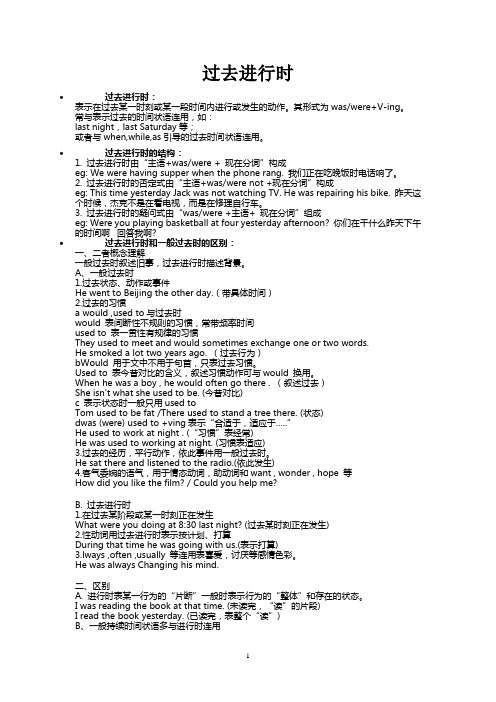
过去进行时∙过去进行时:表示在过去某一时刻或某一段时间内进行或发生的动作。
其形式为was/were+V-ing。
常与表示过去的时间状语连用,如:last night,last Saturday等;或者与when,while,as引导的过去时间状语连用。
∙过去进行时的结构:1. 过去进行时由“主语+was/were + 现在分词”构成eg: We were having supper when the phone rang. 我们正在吃晚饭时电话响了。
2. 过去进行时的否定式由“主语+was/were not +现在分词”构成eg: This time yesterday Jack was not watching TV. He was repairing his bike. 昨天这个时候,杰克不是在看电视,而是在修理自行车。
3. 过去进行时的疑问式由“was/were +主语+ 现在分词”组成eg: Were you playing basketball at four yesterday afternoon? 你们在干什么昨天下午的时间啊回答我啊?∙过去进行时和一般过去时的区别:一、二者概念理解一般过去时叙述旧事,过去进行时描述背景。
A、一般过去时1.过去状态、动作或事件He went to Beijing the other day.(带具体时间)2.过去的习惯a would ,used to与过去时would 表间断性不规则的习惯,常带频率时间used to 表一贯性有规律的习惯They used to meet and would sometimes exchange one or two words.He smoked a lot two years ago. (过去行为)bWould 用于文中不用于句首,只表过去习惯。
Used to 表今昔对比的含义,叙述习惯动作可与would 换用。
过去进行时

过去进行时过去进行时(Past continuous tense或Past Progressive tense)表示过去在某一时间段或某一段时间内正在发生或进行的动作或状态。
中文名过去进行时外文名Past continuous tense or Past Progressive tense意义过去某时某刻正在进行的动作基本结构was/were +Ving具体概念编辑一、概念和用法:过去进行时。
表示过去在某一时间段或某一段时间内正在发生或进行的动作或状态。
其形式为主语+was /were + V-ing。
常与表示过去的时间状语连用,如:last night,last Saturday等;或者与when,while,as引导的过去时间状语连用。
例如:We were watching TV from seven to nine last night. 昨天晚上七点到九点的时候我们在看电视。
What was he researching all day last Sunday? 上周日他一整天都在研究什么?时间段二、过去进行时可以表示在过去某个时间点发生的事情。
时间点可以用介词短语、副词或从句来表示。
如:What was she doing at nine o‘clock yesterday? 昨天晚上九点她正在做什么?(介词短语表示时间点) When I saw him he was decorating his room. 当我看见他的时候他正在装饰房间。
(when从句表示时间点)三、在复合句中,如果主要动作和背景动作都是延续的或同时发生的,那么主从句的动词都可用过去进行时。
例如:While he was waiting for the bus,he was reading a newspaper.他边等车边看报。
(两个动作都是延续的)He was cleaning his car while I was cooking. 他擦车时我在做饭。
- 1、下载文档前请自行甄别文档内容的完整性,平台不提供额外的编辑、内容补充、找答案等附加服务。
- 2、"仅部分预览"的文档,不可在线预览部分如存在完整性等问题,可反馈申请退款(可完整预览的文档不适用该条件!)。
- 3、如文档侵犯您的权益,请联系客服反馈,我们会尽快为您处理(人工客服工作时间:9:00-18:30)。
. 过去进行时的结构及句型变化过去进行时由"was / were + 现在分词"构成。
如:I was doing my lessons then. 那时,我在做功课。
We were cleaning the house. 我们在打扫房子。
过去将来时态的肯定句、否定句和疑问句形式:肯定句例句:I was walking down the street when a UFO landed.否定句例句:I wasn't walking down the street when a UFO landed.一般疑问句例句:Were you walking down the street when a UFO landed?特殊疑问句例句:What were you doing when a UFO landed?过去进行时的用法详解(1) 表示在过去某一时间正在进行的动作,此时句中往往有表示过去的时间状语then,at that time,this time,yesterday等。
I was doing my homework when my mother came to home.(2)叙述在过去的同一时间都在进行的几个动作,通常用WhileI was studying at college while my brother was teaching at university..(3)表示在过去某一段时间内一直持续进行的动作They were expecting you yesterday, but you didn't turn up.英语中有四类动词一般不用进行时(不用现在进行时和过去进行时)1)表心理状态、情感的动词,如love ,hate ,like ,care ,respect ,please ,prefer ,know 等,若用进行时则词意改变。
2)表存在、状态的动词,如appear ,exist ,lie ,remain ,stand ,seem等3)表感觉的动词,如see ,hear ,feel ,smell ,sound ,taste等.4)表一时性的动词,如accept ,allow ,admit ,decide ,end ,refuse ,permit ,promise等。
初中英语过去进行时练习题一、写出下列动词的三单现、过去式和现在分词go ______ _______ _______ enjoy _______ _______ ________buy ______ ______ _______ eat _____ _______ _______get _______ _______ _______ walk ________ _______ ________take______ ______ ______ dance_______ ________ _______write _____ ______ ______ run______ _______ _______swim_____ _______ _______ find _______ _______ _____begin______ ______ ______ eat ______ _______ ______play ______ ______ _______ study ______ ______ ________二、按要求改写句子1. The boy was playing basketball.否定句:____________________________一般疑问句:_________________________肯定回答:__________________________否定回答:______________________2.She was closing the door now.否定句:____________________________一般疑问句:_________________________3.I was doing your homework.否定句:____________________________一般疑问句:_________________________4.The Young Pioneers were helping the old woman.否定句:____________________________一般疑问句:_________________________三、用过去进行时完成下列句子:1.What_________you__________(do)?2.I_____________(sing) an English song.3.What________he____________(mend)?4.He______________(mend) a car.5.______you__________(fly) a kite?Yes,_______.6.______she___________(sit) in the boat?7.______you_____________(ask) questions?8.We_______________(play) games now.用动词的适当形式填空。
1. While we __________ (wait) for the bus, a girl __________ (run) up to us.2. I __________ (telephone) a friend when Bob __________ (come) in.3. Jim __________ (jump) on the bus as it __________ (move) away.4. We __________ (test) the new machine when the electricity __________ (go) off.5. She __________ (not want) to stay in bed while the others ________________ (all, work) in the fields.6. While mother ________ (put) Cathy to bed, the door bell ________ (ring).1. _____ (have) my breakfast at half past six yesterday morning.2. Mary _____ (go) over her lessons from six to seven last night. John and peter ____(do) the same thing.3. What _____ you ___ (do) at that time? We _____ (watch) TV.4. Was your father at home yesterday evening? Yes ,he was. He _____ (listen) to the radio.5. They _____(not make) a model ship when I saw him.6. _____ they ____ (have) a meeting at 4 yesterday afternoon?No, they _____. They _____ (clean) the classroom.7. ______ it ______(rain) when you left school? Yes, it ____. (No, it ____)8. What _____ your father _____ (do) when he was your age?9. One day, Edison _____ (wait) for a train to arrive, and suddenly a little boy ran to the track(轨道) to play.10. He asked me if I ______ (go) fishing that afternoon.11. The three of them were in a hurry because their plane _____ (leave) in five minutes.12. In a letter, john told us that he _____ (come) to china next month.13. When the bell rang, jenny _____ (wait) in her seat.14. She _____ (make) her dress the whole afternoon.15. While my father ____ (look) through the evening paper, he suddenly ____ a cry.二、选择题。
1. I ______ cooked a meal when you _____ me.a. cooked, were ringingb. was cooking, rangc. was cooking, were ringingd. cooked, rang2. He said he _____ to draw a plane on the blackboard at that time. a. tries b. tried c. was trying d. will try3. While she ______ TV, she ______ a sound outside the room.a. was watching, was hearingb. watched, was hearingc. watched, heardd. was watching, heard4. They _____ a football game from 7 to 9 last night.a. were watchingb. watchc. watchedd. are watching5. What book ____ you ______ when I ____ you at four yesterday afternoon?a. did, read, was seeingb. did, read, sawc. were, reading, sawd. were, reading, was seeing6. It was Friday evening. Mr and Mrs. Green _____ ready to fly to England.a. are gettingb. getc. were gettingd. got7. Lei Feng _____ always _____ of others when he ______ in the army.a. is, thinking, wasb. was, thinking, isc. did, think, isd. was, thinking, was8. A girl ______ my pen fall off the table when she _____ me.a. saw, passedb. was seeing, passedc. was seeing, passedd. was seeing, was passing9. We ____ for tom at ten last Sunday. He often kept us ______.a. were waiting, waitingb. were waiting, waitc. waited, waitingd. waited, wait10. He ____ his father on the farm the whole afternoon last Saturday.a. helpsb. would helpc. was helpingd. is helping11. While mother _______ some washing, I _____ a kite for Kate.a. did, madeb. was doing, madec. was doing, was makingd. did, was making12. "_______ you angry then?" "they ______ too much noise."a. are, were makingb. were, were makingc. are, maded. were, made13. He ____ some cooking at that time, so _____ mea. did, heardb. did, didn't hearc. was doing, heardd. was doing, didn't hear14. This time yesterday jack _____ his bike. He _____ TVa. repaired, didn't watchb. was repairing, watchedc. repaired, watchedd. was repairing, wasn't watching15. His parents wanted to know how he _____ on with his new classmates. a. was getting b. gets c. is getting d. will get四、翻译。
